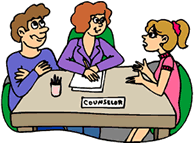
CRIME PREVENTION
 Do you know what child abuse means?
Do you know what child abuse means?
A child can be abused in many ways. Here are some examples of ways that children are abused:
Physical
- You are hit with a hand or an object that makes a mark on your body that doesn't go away within a couple of hours
- You are kicked or punched
- You are burned
- You are thrown into furniture or walls
Emotional
- A guardian that regularly makes fun of you and calls you names
- A guardian that regularly tells you that you are stupid and can't do anything right.
- A guardian that tells you that you are worthless and they wish that you had never been born
- A guardian that tells you anything that is intentionally hurtful and mean.
- It also includes the failure to provide the affection and support necessary for the development of a child's emotional, social, physical and intellectual well-being. This includes ignoring, lack of appropriate physical affection (hugs), not saying "I love you", withdrawal of attention, lack of praise, and lack of positive reinforcement.
Neglect
- You are neglected if you never have enough to eat and drink
- You are neglected if you are not taken care of when you are sick
- You are neglected if you are left alone when you still need adult supervision
- You are neglected if you don't have clothes and shoes to keep you warm
- You are neglected if you are never made to feel like you are cared about
Sexual
- If someone touches you in places that hurt or make you feel uncomfortable or tells you to take your clothes off, this is abuse. If this is happening to you, tell someone that you can trust.
How to Protect Yourself from Abuse
- Don't be alone with anyone that makes you uncomfortable or hurts you.
- Keep telling an adult that you can trust until someone believes you.
Every day in the United States thousands of kids are abused. Often children and teens are abused by the people who are closest to them like family, friends, sitters, neighbors, teachers and coaches. Unfortunately, these are the very people with whom children should feel the safest.
Keep in mind that it is not your fault. You do not deserve to be treated this way. Don't feel like you are all alone. There are other kids going through the same thing as you. Please tell someone you can trust and don't give up.
If you don't want to tell someone that you know, you do have other options. You could call the police or an agency that helps children that are abused.
Childhelp USA is an agency that helps children that are abused. They have a national child abuse hotline that is open 24 hours a day, 7 days a week. The Childhelp USA® National Child Abuse Hotline number is 1-800-4-A-CHILD (1-800-422-4453). The call is free and anonymous. The hotline counselors don't know who you are and you don't have to tell them. You can also visit their web site at www.childhelpusa.org.
Below are other national toll-free numbers that are available to you 24 hours a day:
- RX Abuse - Center on Domestic Violence - 800-313-1310
- Child Welfare Information Gateway - 800-394-3366, www.childwelfare.gov
- National Domestic Violence Hotline - 800-799-7233
- Office for Victims of Crime Resource Center - 800-627-6872
Remember, Be Smart, Be Safe!


![]() Do you know what child abuse means?
Do you know what child abuse means?